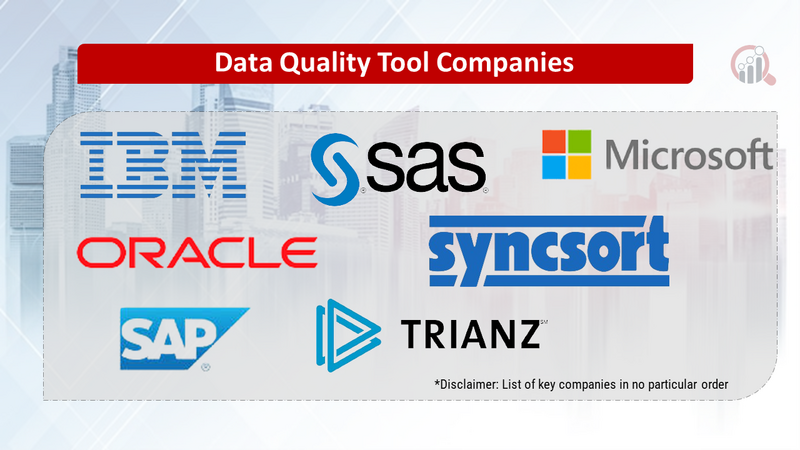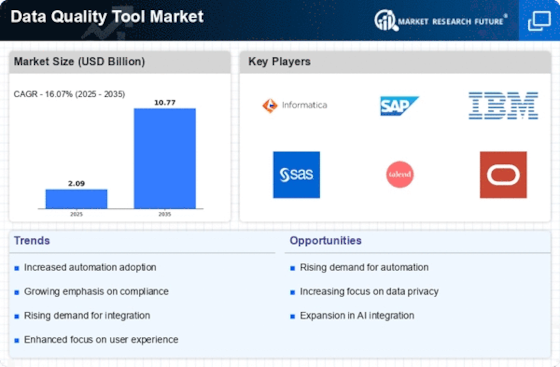Top Industry Leaders in the Data Quality Tool Market

Data Quality Tool Market: Dive into the Latest News and Updates
In today's data-driven world, quality is paramount. Dirty, inconsistent, or incomplete data can lead to flawed analyses, misguided decisions, and costly errors. Enter the Data Quality Tool market, a thriving landscape dedicated to cleansing, profiling, and optimizing data, ensuring its reliability and value.
Some of Data Quality Tool Companies Listed Below:
- SAP SE (Germany)
- Microsoft Corporation (US)
- IBM Corporation (US)
- Experian Data Quality (US)
- SAS Institute Inc. (US)
- Informatica Corporation (US)
- Pitney Bowes (US)
- Information Builder (US)
- Oracle Corporation (US)
- Tamr (US)
- Talend (US)
- Syncsort (US)
- Trianz (US)
Strategic Maneuvers: Winning the Battle for Clean Data
To claim victory in this competitive market, players are adopting these key strategies:
-
Cloud-First Approach: Embracing cloud-based deployments offers scalability, cost-effectiveness, and accessibility, particularly attractive for smaller businesses and agile data environments. -
AI and Machine Learning Integration: Leveraging AI and ML capabilities for automated data discovery, cleansing, and anomaly detection boosts efficiency and accuracy, reducing manual workload. -
Focus on Data Governance and Compliance: Integrating data quality tools with data governance frameworks and ensuring compliance with regulations like GDPR and CCPA builds trust and mitigates compliance risks. -
Collaboration and Partnerships: Collaborating with data integration platforms, cloud providers, and industry experts expands market reach and fosters wider ecosystem adoption.
Market Share Dynamics: Beyond Lines of Code
Analyzing market share in this nuanced landscape requires careful consideration of several factors:
-
Breadth and Depth of Functionality: Offering a comprehensive suite of data quality tools encompassing profiling, cleansing, monitoring, and analytics capabilities holds an advantage. -
Industry-Specific Solutions: Developing tailored solutions catering to the specific data challenges and regulatory requirements of different industries expands market reach. -
Ease of Use and Deployment: Providing user-friendly interfaces, intuitive workflows, and flexible deployment options, from on-premises to cloud-based, increases user adoption and market penetration. -
Security and Data Privacy: Robust data security measures, encryption protocols, and adherence to data privacy regulations are paramount for building trust and ensuring compliance.
New Blood on the Horizon: Reshaping Data Quality Landscapes
Innovative startups are making waves with their disruptive approaches:
-
Hyper-automation and Self-learning Tools: Developing AI-powered tools that automatically learn data patterns, detect anomalies, and continuously improve data quality reduces manual intervention and optimizes data maintenance. -
Data Democratization and Self-service Tools: Empowering users through self-service data quality tools and democratizing access to clean data fosters wider data analysis and utilization across the organization. -
Real-time Data Quality Monitoring and Alerting: Enabling continuous monitoring of data quality in real-time and providing instant alerts for anomalies ensures immediate action and mitigates potential risks. -
Focus on Data Lakes and Unstructured Data Management: Developing solutions specifically designed for managing and improving data quality in data lakes and handling unstructured data formats caters to the growing use of big data analytics.
Investment Boom: Fueling the Quest for Clean Data
The Data Quality Tool market is attracting significant investment:
-
Venture Capital Focus: VC firms are actively backing promising startups developing cutting-edge AI-powered data quality solutions, self-learning tools, and data lake management platforms. -
Private Equity Plays: Established data quality vendors are attracting PE interest due to their stable revenue streams, high growth potential, and recurring subscription models. -
Strategic Partnerships and Acquisitions: Collaborations and acquisitions between data quality vendors, cloud providers, and data analytics companies are accelerating market expansion and technology development.
Latest Company Updates:
February 8, 2024:
-
Focus on automation and machine learning (ML) in DQTs: Automating data cleansing, anomaly detection, and data profiling tasks. -
Concerns about explainability and potential bias in ML-powered DQT algorithms.
February 22, 2024:
-
Rise of cloud-based DQT solutions: Scalability, flexibility, and accessibility for businesses of all sizes. - Emphasis on data security and compliance with data privacy regulations.
March 7, 2024:
-
Growing adoption of data lakes and data warehousing alongside DQTs: Enhancing data quality management for diverse data sources. - Challenges in data governance and ensuring consistent data quality across multiple systems.
March 21, 2024:
-
Focus on data enrichment and data augmentation capabilities in DQTs: Improving data completeness and accuracy for enhanced analytics and insights. - Emphasis on data lineage and traceability for transparent data manipulation and auditability.











